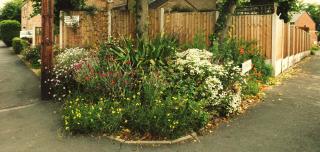

Many of us only get to garden in shared gardens or community allotments. Lockdown obligations are strict regarding this option.
Across Europe and in several US States, rules are very clear: a community garden is not a place where you can spend quarantine time.
Read also:
Kid activities for lockdown gardening:
There are different types of community gardens.
However, government decrees both at local and at national levels are applicable in all cases.
This is where the original meaning of the word “crisis“ makes the most sense: “to make decisions“…
Setting aside legal and government legislation, it’s also important to realize how critical the situation is.
The quarantine has the goal of avoiding and minimizing contact between people.
Most people who spread the virus don’t even shown any symptoms!
Of course, anyone who shows signs of flu such as fever, coughing and so on should stay at home. But he or she will already have spread the virus to dozens of people in the days before symptoms appear!
So it’s precisely when you feel healthy and ready to go tickle those weeds that you might be unknowingly spreading germs and viruses.
On the other hand, a community or shared garden is a very public place.
Moreover, it’s also a preferred outing for retired persons. These are the most vulnerable in case of infection!
Many municipalities have already clearly stated that community gardens are not permitted “quarantine spaces”, unlike private gardens.
Other activities that resemble community gardening have shut down, too. Camping isn’t possible anymore as all campsites are closed.
This depends on how strict the lockdown is.
State and National parks are still open for the moment. Smaller parks where crowding quickly occurs already have closed doors, though.
It’s still possible to garden even on a balcony or terrace. Setting up an indoor plant wall will make your living spaces greener. And there are lots of things you do to garden without leaving the house, even for supplies!
Many of your houseplants may be in need of attention.
There are troves of things you can dig into. Write up a bucket list of things you wish to start when the lockdown is over. Research what you need to get things done.
These are projects you can work on for relatives that might have the space: parents, children, neighbors…
The key outcome in this time of crisis is to reflect on what’s most important: the people we love.
 Cultivate and nurture connections you have that risk being lonely. Pick up the phone and call. Video messaging can be a great comfort to people who stay home.
Cultivate and nurture connections you have that risk being lonely. Pick up the phone and call. Video messaging can be a great comfort to people who stay home.
Each call you place is a seed of love. It will grow and bear fruit, turning into a sweet harvest by the time the crisis will have died down.
Think about the people you might get in “touch” with while relaxing in your meditation garden.